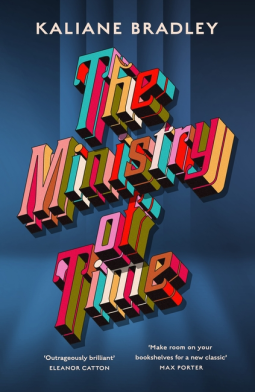About the Book

In the near future, a disaffected civil servant is offered a lucrative job in a mysterious new government ministry gathering ‘expats’ from across history to test the limits of time travel.
Her role is to work as a ‘bridge’: living with, assisting and monitoring the expat known as ‘1847’ – Commander Graham Gore. As far as history is concerned, Commander Gore died on Sir John Franklin’s doomed expedition to the Arctic, so he’s a little disoriented to find himself alive and surrounded by outlandish concepts such as ‘washing machine’, ‘Spotify’ and ‘the collapse of the British Empire’. With an appetite for discovery and a seven-a-day cigarette habit, he soon adjusts; and during a long, sultry summer he and his bridge move from awkwardness to genuine friendship, to something more.
But as the true shape of the project that brought them together begins to emerge, Gore and the bridge are forced to confront their past choices and imagined futures. Can love triumph over the structures and histories that have shaped them? And how do you defy history when history is living in your house?
Format: Hardback (368 pages) Publisher: Sceptre
Publication date: 16th May 2024 Genre: Science Fiction
Find The Ministry of Time on Goodreads
Purchase The Ministry of Time from Bookshop.org [Disclosure: If you buy books linked to our site, we may earn a commission from Bookshop.org, whose fees support independent bookshops]
My Review
I first heard about this book at the Women’s Prize Live event in June last year. Listening to the author talk about it, I thought then that the premise sounded really intriguing so, prompted by enthusiastic early reviews by other book bloggers, I was thrilled when my request for it was approved on NetGalley.
I’ll confess that, for a while, I wasn’t quite sure if the book was going to work for me. I recall commenting to another book blogger that the author didn’t seem to have made up her mind whether she was writing science fiction or romance. I shouldn’t have worried because the book is an inventive and totally absorbing blend of both with a dash of historical fiction and an element of mystery added for good measure. If this all sounds a bit of mishmash, think of it instead as a glorious cocktail of different ingredients that once you’ve downed it you immediately want to drink again… except this time surely it tastes slightly different?
I’m not going to try to summarise the plot for fear of spoilers but what I can say is you will meet some wonderful characters. Commander Graham Gore, obviously, but also Arthur (‘1916’) and Margaret Kemble (‘1665’). There’s a lot of humour as the ‘expats’ are introduced to modern technology, attitudes and concepts by their ‘bridges’. Margaret’s 17th century mode of speech and inventive cursing is both endearing and very funny.
But there’s also a serious side as well as the expats learn about world events that have taken place since they were ‘extracted’ from their own time. For example, Arthur, having been plucked from the Battle of the Somme, is horrified to discover that there was a second world war, although in other ways the modern world may be more accommodating than the one he left. Having all been rescued from certain death, survivor’s guilt is real for them. This is especially the case for Gore once he learns the fate of his comrades on Sir John Franklin’s Arctic expedition. He is haunted by the knowledge his markmanship might have made a difference to their survival. I particularly liked the sections which take us back in time to witness the ill-fated mission from the point of view of Gore.
There’s a sinister aspect to the way the expats are constantly monitored (in more ways than they realise), periodically assessed and tested by Ministry officials, and reported on by their ‘bridges’ who also exercise control over the information they are given. Just why these particular individuals were chosen to be ‘rescued’ becomes a source of mystery too.
There’s an interesting parallel made between the assimilation of the expats into the modern world (to misquote E. M. Forster, ‘The present is a foreign country: they do things differently there‘) and the experience of people moving from one culture or country to another. Gore’s bridge is part-Cambodian and the daughter of immigrants so she has had to be a ‘bridge’ for her Cambodian mother, helping her learn a new language and so on.
A wonderfully supportive relationship develops between the three expats and the narrator also becomes more a friend than a ‘bridge’, although this brings its own challenges for her. One particular relationship becomes the main focus of the story and if it doesn’t touch your heart I’ll be surprised.
Towards the end of the book, the author really ups the action and throws in a terrific curved ball that took my brain a while to unscramble. The message I had no difficulty understanding, though, was that whereas you can’t change the past, you can change the future. Oh, and the enduring power of love.
I thought The Ministry of Time was mindbendingly brilliant and definitely among the most enjoyable books I’ve read so far this year.
I received an advance review copy courtesy of Hodder & Stoughton via NetGalley.
In three words: Imaginative, clever, enthralling
Try something similar: The Psychology of Time Travel by Kate Mascarenhas
About the Author

Kaliane Bradley is a British-Cambodian writer and editor based in London. Her short stories have appeared in Electric Literature, Catapult, Somesuch Stories and The Willowherb Review, among others. She was the winner of the 2022 Harper’s Bazaar Short Story Prize and the 2022 V.S. Pritchett Short Story Prize. The Ministry of Time is her first novel. (Photo: Goodreads author page)


I got FOMO and bought a copy last week. Glad you ended up liking it so much.
LikeLiked by 1 person
You’ve persuaded me, Cathy. Great review!
LikeLiked by 1 person
I was not aware of this book. It sounds like an interesting premise!
LikeLike
Sounds excellent, thanks for the review, I too have seen this on Instagram and you’ve made my mind up for me now to give it a go.
LikeLike
I do hope you enjoy it as much as I did.
LikeLiked by 1 person